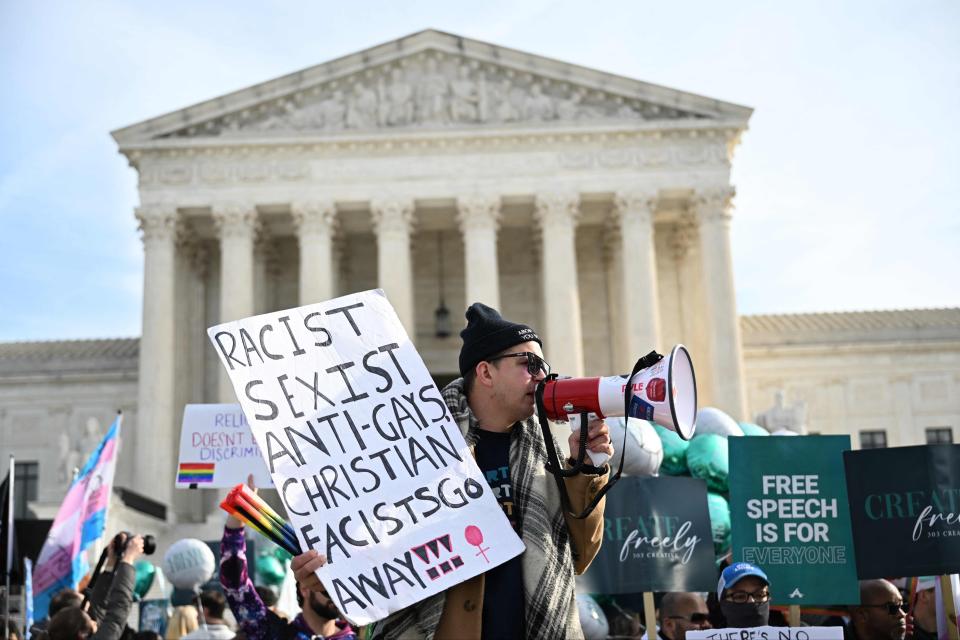Supreme Court signals support for website designer who wants to decline same-sex weddings
WASHINGTON – A majority of the Supreme Court on Monday appeared sympathetic to a web designer who wants to decline to create websites for same-sex weddings, embracing the idea that a state anti-discrimination law cannot compel her to do so.
In a case that could have profound implications for when businesses may turn away customers, the Colorado website designer argues the state should not be permitted to use a law designed to ensure businesses take all comers to compel her to communicate messages to which she objects.
The two-and-a-half-hour debate centered on whether same-sex couples would be denied wedding websites because of their status as LGBTQ individuals – a result that might favor the state – or whether the designer was refusing to endorse a message of approval of same-sex marriage that she says conflicts with her religious beliefs.
Guide: A look at the key cases pending before the Supreme Court
Preview: Supreme Court to debate if businesses may decline same-sex weddings
Granted: Supreme Court to decide if businesses may refuse LGBTQ weddings
The law at issue bars public businesses from discriminating on the basis of sexual orientation – the same law that bars discrimination based on race and gender. But Associate Justice Clarence Thomas was one of several conservatives who questioned whether a website designer is more like a retail business under the law or more like an artist.
"This is not a hotel," Thomas said at one point. "This is not a restaurant. This is not a riverboat or a train."
Colorado and its supporters assert that a win for the designer, Lorie Smith of 303 Creative, would have much broader consequences. If a business may decline to create a website for an LGBTQ couple based on an objection to same-sex marriage, they say, couldn't it also decline to make one for an interracial family?
Associate Justice Samuel Alito appeared to reject that argument, drawing a distinction based on who is being discriminated against. Alito repeatedly referenced a line from the Supreme Court's landmark 2015 decision to legalize same-sex marriage in which the court said "many who deem same-sex marriage to be wrong reach that conclusion based on decent and honorable religious or philosophical premises."
"Do you think it's fair to equate opposition to same-sex marriage with opposition to interracial marriage," Alito asked the attorney representing Colorado.

The court's liberal justices appeared mostly aligned in favor of Colorado's law.
Associate Justice Ketanji Brown Jackson questioned whether, under the website designer's approach, a photography studio could say it wanted to shoot and sell photographs harkening to widely recognized images of Christmas from the 1940s and 1950s that featured only white children with Santa Claus. Could that photographer stage only white children and decline to take pictures of Black children for the product?
The lawyer representing Smith acknowledged that might be an "edge case."

Jackson's hypothetical prompted another one from Alito: What if a Black Santa "doesn't want to have his picture taken with a child who's dressed up in a Ku Klux Klan
outfit," he asked. Would the Black Santa be prohibited from denying that child?
No, the attorney for Colorado said, because the state's law that governs public businesses doesn't deal with people wearing Ku Klux Klan outfits.
Four years ago, a 7-2 majority of the Supreme Court sided with a Colorado baker who refused to create a custom wedding cake for a same-sex couple. But that decision was focused narrowly on how the state’s civil rights commission treated the baker, Jack Phillips. The court did not rule on broader questions about where to draw the line between a business owner’s religious freedom and LGBTQ rights.
The lack of clarity on that question has led to other lawsuits, including from a florist in Washington state who declined to create an arrangement for a same-sex wedding. The Supreme Court declined to hear that case last year.
A three-judge panel of the Denver-based U.S. Court of Appeals for the 10th Circuit last year ruled against Smith. The court agreed that her websites are a form of speech. It also said the state’s anti-discrimination law compelled Smith to create speech that celebrated same-sex marriage. But in a 2-1 ruling, the court said Colorado had an interest in preventing discrimination and ensuring "equal access" to goods and services.
The case is 303 Creative LLC v. Elenis. A decision is expected next year.
This article originally appeared on USA TODAY: High court hints support for web designer opposed to same-sex weddings
